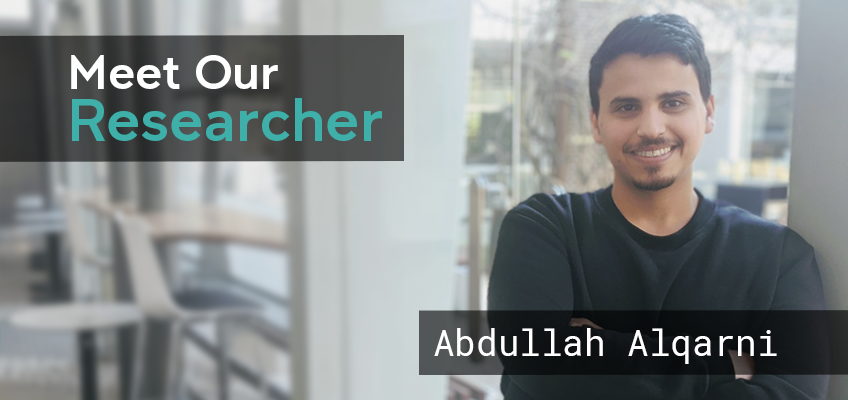23 Sep 2020

Normal ageing process can be defined as a subtle decline of mental and physical abilities. A decline in our thinking abilities, memorising and recalling memories or thoughts, as well as decline in maintaining attention are examples of the normal ageing process. Normal ageing might differ between men and women due to intrinsic gender differences such as hormonal and genetic traits. Abdullah Alqarni, a PhD Candidate at CHeBA studies the sex differences in white matter hyperintensities and how they affect normal ageing for both sexes.
How did you get into researching the ageing brain?
I graduated from Prince Sattam bin Abdulaziz University (PSAU) with a Bachelor Degree in Medical Imaging. Following this, I worked for a year as a medical imaging technician at the Saudi Oil company (Aramco) Hospital, which is now run by a Johns Hopkins healthcare provider. Although I enjoyed this role, I kept thinking I could broaden my knowledge and promote mental health awareness through academia. As a result, I joined the medical imaging department at PSAU, which qualified me to a full scholarship to pursue higher academic degrees (MSc, and PhD). Immediately, I started looking for a Master’s program in neuroimaging that specialised in brain health research - and I was fortunate to receive an offer from the University of Nottingham in the United Kingdom to do a Master’s degree. It was while completing my Masters in the UK that I made the decision to study normal ageing. I was already studying Parkinson’s disease as part of my Master’s thesis and I understood that Parkinson’s manifests early in life but symptoms do not present until later in conjunction with the degeneration of substantia nigra. Therefore, I wanted to understand what affects normal ageing first, and then see how the mechanisms differ in neurological disorders.
Did you experience a ‘defining moment’ which led you to this field?
My initial motivation to study neuroimaging was witnessing the effect of Alzheimer’s disease on my grandmother. It was exceptionally difficult to watch her lose her memories over the years. Each time I visit her it breaks my heart, because I had really enjoyed listening to her stories and learning from her wisdom and guidance.
This personal experience highlighted the importance of the field and drove me to do my part to contribute.
Do you have any personal interests or activities which are protective behaviours against cognitive decline?
A balanced lifestyle is my answer for anyone seeking to improve mental, physical and social health. Cognition can be preserved by practicing balanced intellectual and physical activities. Also, maintaining a balanced diet contributes to better physical and mental health. Personally, keeping my brain intellectually active is important. Aside from my current and future work as a researcher which requires a lot of complicated reading, I enjoy reading books in a variety of different fields such as biographies. This helps broaden my knowledge and understanding of other fields and complex mental activity is widely recognised as protective for brain health. When I have the opportunity, I also enjoy playing games such as chess because it improves my strategic thinking. As for physical health, I do brisk walking between 30 and 60 minutes each day to keep the blood flowing.
What are you currently researching?
I am currently investigating the sex differences in White Matter Hyperintensities (WMH). Based on the literature, women have a higher burden of WMH in older age compared to men. The purpose of my PhD project is to shed some light on how sex moderates the association between risk factors such as hypertension, Body Mass Index (BMI), diabetes and WMH. Also, we want to compare the difference in WMH load between men and women and what risk factors contributed to this difference. Eventually, we hope to uncover which physical or mental functions were affected.
Why is your research important?
Evidence from the literature shows that WMH might appear in early age and progress throughout life if different risk factors are present. As such, it is worth controlling because otherwise it could potentially lead to a stroke or cognitive decline.
By identifying the risk factors that contribute differently to WMH in men and women, clinicians will be able to make better and more informed decisions on how to control those risk factors for both sexes. Moreover, it might be possible to control or even reverse the progression of WMH.
What do you love about working for CHeBA?
I have friends who are doing PhD studies elsewhere and I can say that I am lucky to be here at CHeBA. Since I started at CHeBA, I receive help whenever I need it. Everyone is very generous with their advice on statistics or coding or other parts of research as well as being highly approachable. CHeBA is a practical, easily accessible and friendly working environment. It is great to be here.
What is the ultimate hope you have for your research?
The brain controls the body; however, an imbalanced lifestyle will affect the brain’s ability to function properly. In the long-term this might result in a negative ageing process. My ultimate hope for my research is to establish standardised guidelines to help control poor ageing process and improve quality of life for individuals.
This interview was undertaken during the COVID-19 self-isolation period. Abdullah Alqarni found that having video calls with his family and friends supported his mental resilience and kept him feeling socially connected while physically isolated.
Donations are fundamental for critical research to continue following COVID-19.
If you would like to discuss supporting Abdullah's work specifically, or would like information
on leaving a legacy via a Gift in your Will, please contact h.douglass@unsw.edu.au.

Abdullah Alqarni is a PhD Candidate at CHeBA exploring the effect of sex differences on the level of White Matter Hyperintensities individuals have in the brain. Abdullah obtained a Bachelor of Medical Imaging at the Prince Sattam bin Abdulaziz University, Saudi Arabia and a Master of Translational Neuroimaging at the University of Nottingham in the United Kingdom.
